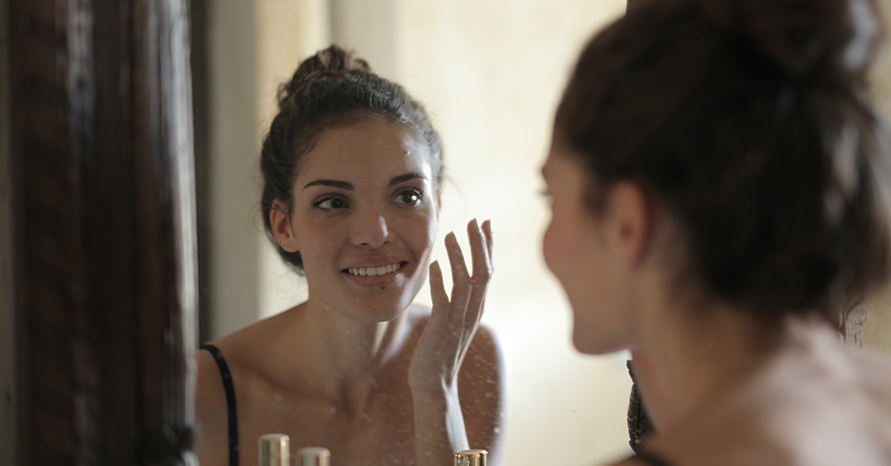Winter Weather Poses Unique Challenges to Healthy Skin and Hair

As falls transitions to winter and the air becomes colder and drier, our skin and hair can suffer the consequences. Conditions such as dry skin and brittle hair become more prevalent when the home heating season begins, but Michelle Tarbox, M.D., a dermatologist for Texas Tech Physicians, said there are steps we can take to help keep these conditions at bay.
Because humans are primarily comprised of water, Tarbox said we should think about how water behaves to better understand why our skin gets cranky this time of year.
“When you look at water, even on a microscopic scale, it will always flow downhill,” Tarbox said. “If you have a higher water gradient, and you're going into a place that has a lower water gradient, you're going to lose water to that environment, and that goes for our skin as well. In the wintertime, we tend to turn our heaters on and that dehydrates the indoor air, so it's actually sucking moisture out of our skin.”
Tarbox said there are several steps people can take to help their skin retain its moisture during the winter. She encourages her patients to be gentle with their skin and avoid anything that's going to strip away its moisture or natural oils, including hot water. Using gentle cleansers that don't contain a lot of foam and fragrance also can be beneficial, though Tarbox recommends limiting one’s exposure to cleansers by using them only on areas of the body that typically need regular cleaning such as the armpits, groin, hands and feet.
“The rest of your body really doesn't need to be slathered and lathered up,” Tarbox pointed out. “The water running over the skin with whatever residual soap from those other areas is perfectly sufficient unless you've been rolling around in our West Texas dirt or caught out inside one of our haboobs.”
Because the air can be so different, the same skin care products that work for someone in the summer may not provide the same benefits during the winter. As the temperatures fall, using rich, thick moisturizers that contain less water is recommended. While that appears to be counterintuitive, Tarbox said that as water evaporates from the skin, it could take extra water from the body with it. She advises her patients to swap the more watery lotions of summer for thicker products such as petroleum jelly or non-petroleum options such as Waxelene, Un-Petroleum, CeraVe or Cetaphil.
“Anything that looks like something you could get through a straw is probably not going to be enough for the moisturizer you might need in the wintertime,” Tarbox said. “Think about using things that you could do the good old [DQ] Blizzard trick with, where you open the container and hold it upside down and nothing comes out. That's going to be a lot more likely to give you good moisturization.”
As we age, the sebaceous glands in our skin that produce oil work less efficiently. This can lead to a condition called asteatotic eczema, which is a form of skin irritation caused by dryness and lack of sufficient skin oils. Tarbox said elderly patients may require additional care to maintain a healthy skin barrier and reduce areas of dryness or flaking.

“If your skin is dry and flaky, it can't keep you waterproofed to the outside environment, so you lose more water to the air,” Tarbox said. “It also can't seal you against irritants from the air such as chemicals that could get on your skin, or from things that might be deposited there such as detergents.”
When traveling during the winter, Tarbox said to consider the environment of your destination, where the water may contain different chemicals and have a different pH balance. Air travel also creates a dry environment, so she recommends moisturizing skin surfaces and using a sterile saline nasal spray to moisturize the nasal passages when flying.
Because the skin can still be damaged from sun exposure in the winter, Tarbox promotes the use of hats and sunscreen for her patients when they're outdoors, regardless of age. In fact, there are several studies that suggest gentle skincare and regular moisturizing during childhood can be beneficial. Consistent use of these products, especially when combined with hats and long sleeves can help to provide a foundation for lifelong skin health.
“The biggest thing about winter skincare is to be kind to your skin,” Tarbox emphasized. “I like for people to think about a newborn baby's skin and how carefully you might take care of it. You wouldn't scrub it with harsh cleansers and you wouldn't leave it with skin that looks chapped, irritated and raw. The earlier you treat discomforting problems in the skin, the more rapid your relief will be, the less severe the condition will be and the less likely it will become a chronic problem.”
Turning up the heat in the winter months also creates special needs for our hair. A warmer internal environment and hotter showers can wash away some of the oil that's necessary for our hair to stay moisturized and healthy. Daily hair washing also may not be necessary, depending upon one’s hair texture and oil production.
“If your hair feels clean and smells clean, there's no reason to wash it every day,” Tarbox said. “Washing just for washing’s sake or out of habit might actually exacerbate some problems.”
For people who are prone to dry, brittle hair, Tarbox recommended avoiding shampoos that contain sodium lauryl sulfate, a common foaming agent that's used in many commercially available shampoos. Using a conditioner after shampooing also can keep the hair from becoming too dry or brittle.
The change in seasons also can cause hair loss. In fact, Tarbox has some patients whose bodies respond to the changing winter environment by shedding hair. A typical winter shed may go unnoticed, but the hair loss may become more evident during events that add significant stress, such as the COVID-19 pandemic. People who have recovered from COVID-19 also have experienced significant hair shedding.
“The important thing to remember about stress-induced hair shedding is that for the vast majority of patients, this is not a permanent circumstance; it can be reversed with proper nutritional support,” Tarbox said. “If the hair loss is very severe, it's really important to seek medical care, and if there are any other factors involved with the hair loss such as a lot of itching, redness or scaling, that might be an indication of something more serious that needs medical attention.”
Related Stories
Celebrating Veterans: TTUHSC’s General Martin Clay’s Legacy of Service and Leadership
From his initial enlistment in the Army National Guard 36 years ago to his leadership in military and civilian health care management roles, Major General Martin Clay’s career has been shaped by adaptability, mission focus and service to others.
Texas Tech University Health Sciences Center School of Nursing Named Best Accelerated Bachelor of Science in Nursing Program in Texas
The TTUHSC School of Nursing Accelerated Bachelor of Science in Nursing (BSN) program has been ranked the No. 1 accelerated nursing program in Texas by RegisteredNursing.org.
TTUHSC Names New Regional Dean for the School of Nursing
Louise Rice, DNP, RN, has been named regional dean of the TTUHSC School of Nursing on the Amarillo campus.
Recent Stories
National Academy of Inventors Names TTUHSC Faculty Senior Members
The National Academy of Inventors (NAI) has designated two current and one former TTUHSC faculty researchers as Senior Members.
The John Wayne Cancer Foundation Surgical Oncology Fellowship Program at Texas Tech University Health Sciences Center Announced
TTUHSC is collaborating with the John Wayne Cancer Foundation and has established the Big Cure Endowment, which supports the university’s efforts to reduce cancer incidence and increase survivability of people in rural and underserved areas.
TTUHSC Receives $1 Million Gift from Amarillo National Bank to Expand and Enhance Pediatric Care in the Panhandle
TTUHSC School of Medicine leaders accepted a $1 million philanthropic gift from Amarillo National Bank on Tuesday (Feb. 10), marking a transformational investment in pediatric care for the Texas Panhandle.
